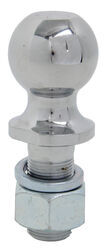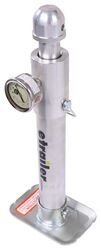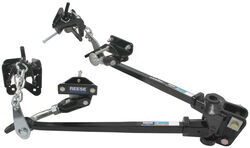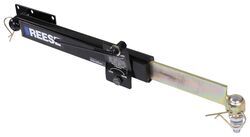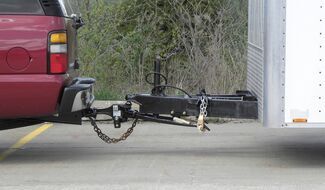
Recommended Sway Control for Trailer Over 12,000-lbs
Question:
What do you recommend for independent sway control from a trailer in the 12,000-14,000lb range? I saw one answer that stated to use two sway control bars for trailers from 6,000-10,000lb, but nothing about heavy loads.
asked by: Charlie S
Expert Reply:
Independent friction-style trailer sway control systems like the Reese # 83660 can help with trailer sway in lighter trailers, and two of them can be used with trailers up to about 10K and 26-feet or more in length. For a trailer over 10,000-lbs you will need a dependent (or built-in) type sway control that works with a weight distribution system. Friction units simply cannot deal with sway in trailers over that weight.
The key to selecting a weight distribution/sway control system (WD/SC) is to know the trailer's actual fully loaded tongue weight (TW) and to this to add the weight of anything in the tow vehicle that sits behind the rear axle, say a generator or loaded cooler. This total effective TW figure will let you choose a system that is tuned correctly for your trailer's TW and deliver the weight shift and sway reduction you are looking for. I linked an article on weight distribution systems and also one on determining trailer tongue weight, such as by using a scale # e99044.
With that TW known you can use the linked page to select a system. Click on your total TW figure to see suitably-rated system that include sway control. For an example we'll figure on a TW of 1400 to 1500-lbs. A great choice for a trailer with electric brakes and this TW is the Reese Strait-Line trunnion system # RP66075. All you need to add is a shank and a hitch ball, such as # RP54977 and # 63840.
This system will not only prevent sway from starting, it will shift some TW forward onto the tow vehicle front axle to maintain traction for proper steering and braking.

Products Referenced in This Question
2-5/16" Hitch Ball - 1-1/4" Diameter x 2-3/4" Long Shank - Chrome - 20,000 lbs
- Trailer Hitch Ball
- Trailer Hitch Ball
- Standard Ball
- Chrome-Plated Steel
- 2-5/16 Inch Diameter Ball
- 2-3/4 Inch Shank Length
- 1-1/4 Inch Diameter Shank
- 20000 lbs GTW
- Class IV
- Class V
- Draw-Tite
more information >
etrailer Tongue Weight Scale for Campers and Utility Trailers - 2,000-lb Capacity
- Tongue Weight Scale
- Analog Scale
- 2000 lbs
- etrailer
more information >
Strait-Line Weight Distribution w/ Sway Control - No Shank - Trunnion Bar - 17K GTW, 1,700 lbs TW
- Weight Distribution Hitch
- WD With Sway Control
- Some Sway
- Shank Not Included
- Electric Brake Compatible
- Fits 2-1/2 Inch Hitch
- Allows Backing Up
- 1200 lbs
- 1300 lbs
- 1400 lbs
- 1500 lbs
- 1600 lbs
- Reese
more information >
Product Page this Question was Asked From
Reese Friction Sway Control Kit - Economy - by Draw-Tite, Reese and Hidden Hitch
- Accessories and Parts
- Weight Distribution Hitch
- Sway Control Parts
- Reese
more information >
Featured Help Information
Instructions
Miscellaneous Media

Continue Researching
- Article: Which Sway Control Hitch is Right For Your Trailer?
- Article: 5 Things to Know About Weight Distribution Hitches
- Article: How to Measure for Trailer Hitch Drop
- Article: Steel vs. Aluminum Ball Mounts
- Q&A: Can Sway Control be Used on a Trailer without Using Weight Distribution
- Q&A: Should 1 or 2 Bar-Style Friction Sway Control Units be Used on a 7,000 Pound Trailer
- Q&A: Recommended Weight Distribution System for a 3,500 lbs Trailer
- Q&A: Availability Of TLC65 Trimax Trailer Wheel Chock and Lock With A23456 Keys
- Article: Determining Trailer Tongue Weight
- Q&A: What Towing Mirror Extensions Will Fit My 2022 Toyota Tundra Limited?
- Article: How to Choose the Right Trailer Hitch Class
- Article: Ball Mount Basics: Weight Capacity, Class, and Size
- Q&A: Parts Needed to Add Brake Controller to 2024 Toyota Sienna Platinum
- Q&A: Can Trailer Be Reversed with Reese Friction Sway Control Unit Installed



